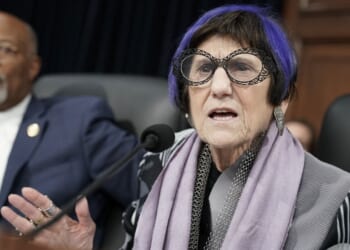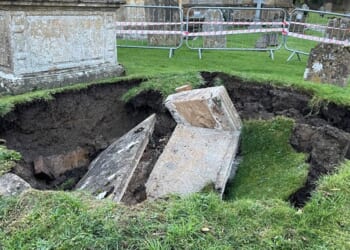(LifeSiteNews) — A business manager who worked at a Catholic cathedral was fired after voicing concerns about a minor sleeping over at the rectory as well as fiduciary compliance problems, the whistleblower told LifeSiteNews in an exclusive interview.
Donald Harris, former business manager at Corpus Christi Cathedral in Texas, first heard reports from staff that a 17-year-old minor slept over at the cathedral rectory in February 2020. He promptly reported those concerns, as he is required to do so by Texas law, notifying diocesan officials as well as Bishop Michael Mulvey, STL, DD, by email.
While Harris only knows with certainty about one night the teen spent at the church rectory, the youth’s presence at the cathedral continued. On Feb. 19, 2020, Harris saw the teen use one of a cathedral priest’s three access cards to enter the front door of the church office, which is connected to the rectory. Harris then notified a staffer, who said the minor’s parent was aware he was spending the night at the cathedral, but that “that did not make it right.”
On Feb. 20, 2020, Harris saw the teen again let himself into the church office using the priest’s access card and again notified one of the church employees. A few days later, as Harris was leaving a vigil Mass, he noticed the minor’s car was parked in front of the cathedral priest’s parking garage and mentioned it to another cathedral clergy member, who had already himself raised concerns with Harris about the relationship between the teen and another resident priest.
A few days later, when Harris discovered the youth was 17 years old, he called the church employee he had earlier notified to let the employee know the teen was in the church office again, and that he was very concerned to learn he was a minor. The staffer agreed it was a serious concern and made recommendations about how to bring these concerns forward.
The same day, Feb. 26, 2020, Harris emailed Bishop Mulvey about everything he had witnessed involving the minor. Not long after, in March, all cathedral operations were suspended due to COVID-19.
Harris told LifeSiteNews that the teen was seen at the rectory up until September 2020, after the church itself had been closed for months, and that he was reporting the teen’s presence up until that time.
When Harris didn’t hear back from the bishop or diocese, he followed up about his concerns over the minor’s overnight presence at Corpus Christi Cathedral. He eventually met with the diocesan officials and was asked questions about the reported incident. The officials indicated they would follow up, Harris told LifeSiteNews, but to his knowledge they never did.
Financial concerns
Beginning in 2020, Harris repeatedly raised fiduciary-compliance concerns within the Cathedral Finance Council regarding restricted funds, a cathedral endowment, and financial reporting practices. He said diocesan officials were “dismissive” of his concerns.
“My questions involved the proper handling of restricted or designated funds — donations given for specific purposes such as building projects or charitable programs,” Harris recounted. He asked that these funds be administered “in accordance with donor intent.”
Harris didn’t receive any indications that his concerns would be formally reviewed or investigated. “Rather than being addressed internally, the issues were treated as unwelcome,” he said.
When no changes to the cathedral’s financial practices were made, Harris again questioned how restricted funds and endowment accounts were being handled at the November 2023 meeting.
Fast forward to March 2024 and Harris was fired by the cathedral’s general counsel despite the fact that, as Harris put it, he was “always accurate and had no impropriety.” They had not specified such problems with Harris and never addressed his concerns about the minor at the rectory or church finances.
Meanwhile, the offending priest is still operating normally within the diocese.
Harris, stunned at his termination after bringing multiple ethical concerns to light, has since sued Bishop Mulvey of the Diocese of Corpus Christi on Sep. 16, pro se.
“I think it’s incredible, it’s unbelievable,” Harris told LifeSiteNews. “I’m not trying to besmirch anyone; this is about transparency. It is inappropriate for the leadership of the Church to terminate people when they bring concerns forward in good faith. I was only doing my job.”
LifeSiteNews attempted to contact the diocese but had not received a response before publication.
As Harris stated in a press release announcing his lawsuit, his “obligation was clear — to protect the vulnerable, to safeguard restricted funds, and to uphold the law.”
“What kind of message is being sent from the leadership? That this kind of behavior will be tolerated,” he told LifeSiteNews. “We look the other way and we make sure our employees look the other way.”
He pointed out that lawyers are hesitant to sue the Catholic Church hierarchy because, they say, “it’s hard to get a judgment against the Church.”
To this day, Harris has not received any substantive communication from the diocese since he filed his federal complaint. On Oct. 7, the diocese filed a motion to dismiss the case.
Harris noted in his press release that his case challenges the Ministerial Exception, which legally allows churches to select and govern their own ministers without government interference. He said he believes the Ministerial Exception “has too often become a linchpin shielding church leadership from accountability.”
“The First Amendment was never meant to allow retaliation against whistleblowers or the concealment of safeguarding concerns,” he added.
Harris’ experience in Corpus Christi, unfortunately, reflects a broader pattern within the Catholic Church. He pointed to the recent $230 million settlement by which the Archdiocese of New Orleans compensated the victims of clergy sex abuse. The case “illustrates the consequences when allegations are mishandled with secrecy and denial rather than openness and accountability,” Harris said.
















